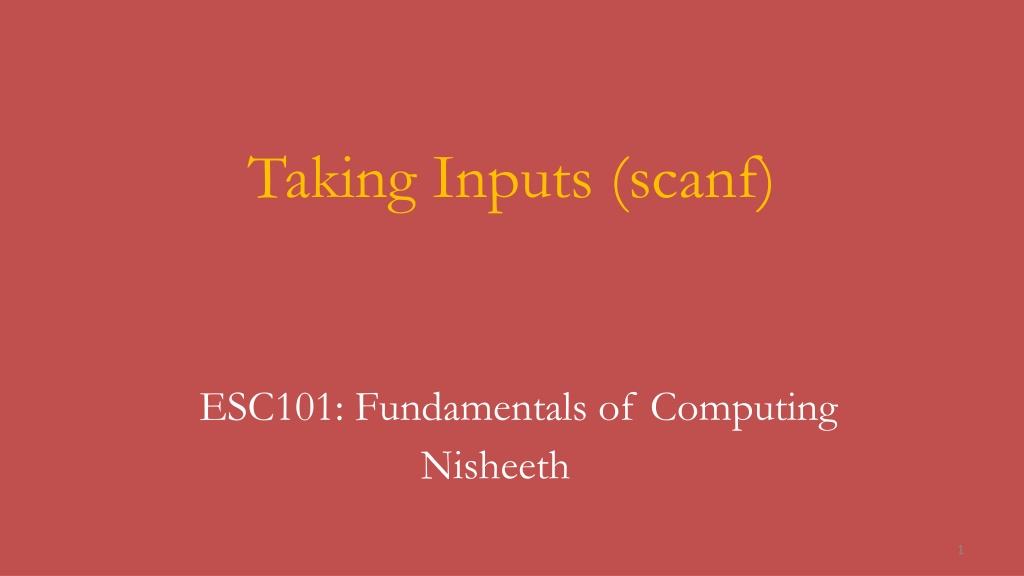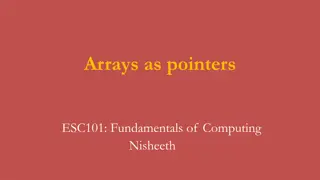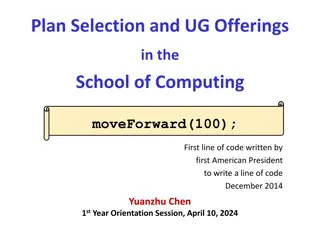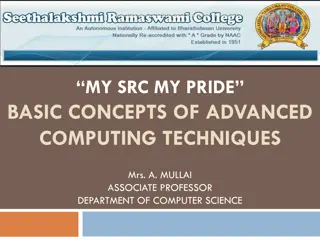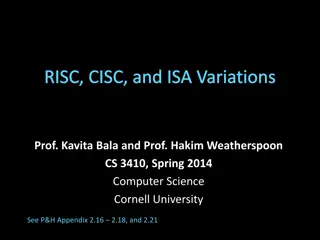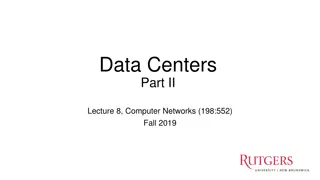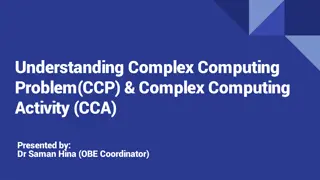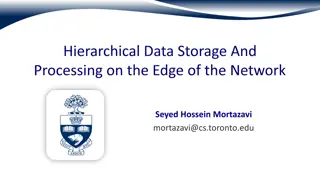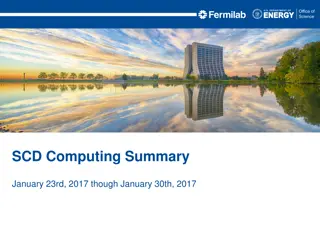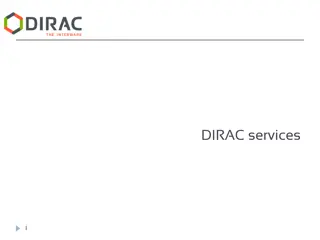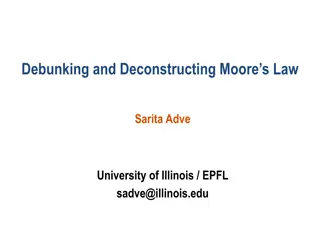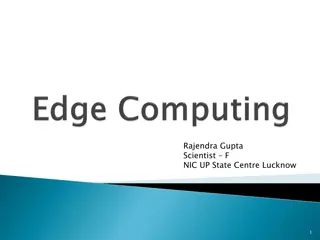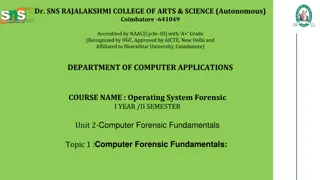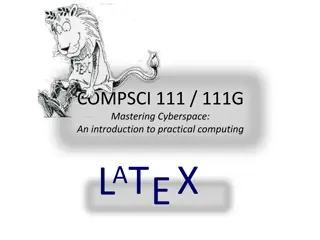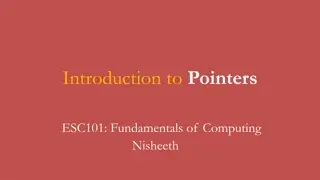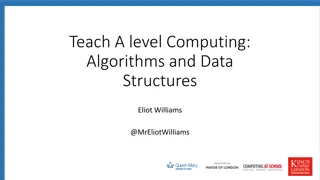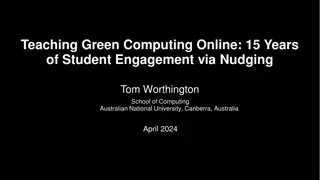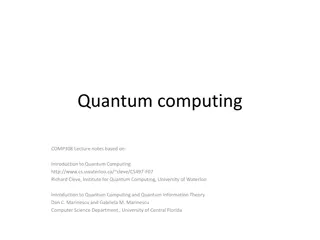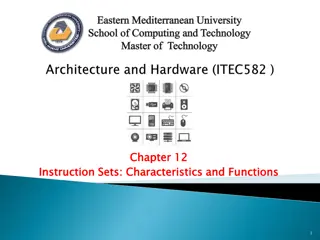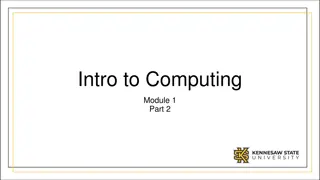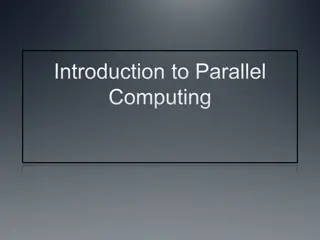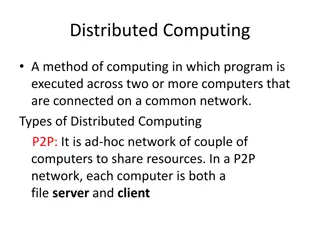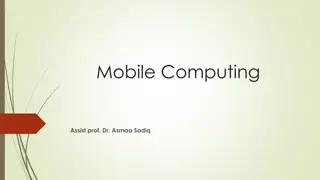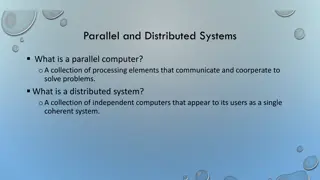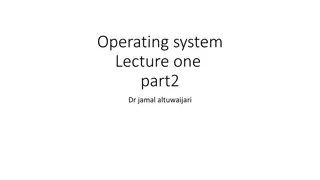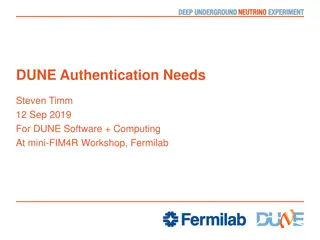Fundamentals of Computing Recap
This content provides a quick recap of fundamental concepts in computing, including taking inputs with scanf, the structure of a C program, variable declaration and assignment, and common errors in code. It covers essential concepts for beginners in programming.
Download Presentation

Please find below an Image/Link to download the presentation.
The content on the website is provided AS IS for your information and personal use only. It may not be sold, licensed, or shared on other websites without obtaining consent from the author. Download presentation by click this link. If you encounter any issues during the download, it is possible that the publisher has removed the file from their server.
E N D
Presentation Transcript
Taking Inputs (scanf) ESC101: Fundamentals of Computing Nisheeth 1
Announcements Graded labs starting today Prutor accounts: Hopefully everyone now has a working Prutor account (accessible via your CC email id and CC password) If not, please arrive at the lab early (by 1:45pm) and we will create your account on the spot 2
Recap Every C program s entry point (program s execution starts here) is the main function with return type integer Tells C compiler to include the standard input/output library stdio.h (collection of functions such as printf, scanf, etc) #include<stdio.h> int main(){ printf( Welcome to ESC101 ); return 0; } The main function must return an integer (return 0 means successful execution of program) main function must open with left curly brace { printf function prints a user specified output main function must close with right curly brace } Every statement in a C program must end with semi-colon ; printf( Welcome to ESC101 ) and return 0 are statements in the above code. Each C statement must end with a semi-colon ; 3 3
Recap 1 2 a b # include <stdio.h> int main () { int a = 1; int b = 2; int c; c = a + b; printf( Result is %d , c); return 0; } Each variable s declaration creates a box big enough to store it at a location in computer s main memory (RAM) 3 c Assigning a value to the variable writes that value in the box = and + are operators = is assignment operator + is addition operator a+b is an expression The program prints the message Result is 3 4
Whats Wrong Here? # include <stdio.h> int main () { int a = 1; int b = 2; c = a + b; printf( Result is %d , c); return 0; } Can t assign a value to c since it has not been declared yet Will NOT Compile 5
Whats Wrong Here? # include <stdio.h> int main () { int a; int b; int c; c = a + b; printf( Result is %d , c); return 0; } Can t use variables a and b in this assignment operation since a and b have not been assigned a value (initialized) in this program Will Compile but will print garbage 6
Whats Wrong Here? # include <stdio.h> int main () { int a = 1; int b = 2; int c; printf( Result is %d , c); return 0; } Will print some garbage value since c has not been assigned a value (initialized) yet Will Compile but will print garbage 7
What About This? # include <stdio.h> int main () { int a; int b; int c; c = a + b; a = 2; b = 1; printf( Result is %d , c); return 0; } Can t use variables a and b in this assignment operation since a and b have not been assigned a value (initialized) in this program yet. Assigning a and b values later does NOT solve this problem Will Compile but will print garbage 8
Lesson Learned Declare and initialize (or assign values to) your variables properly before their use 9
Recap: Alphabet and Keywords of C C programs can be written using the following alphabet A B .... Z a b .... z 0 1 .... 9 Space . , : ; $ # % & ! _ { } [ ] ( ) | + - * / = Keywords in C 10
Naming Convention for Variables and Functions We have seen variables and their usage in programs We have seen the main and printf function (and will see various other standard functions and user-defined function later) Need to follow some rules for naming of variables and functions Names can only contain A-Z, a-z, 0-9, and underscore _ Can t begin a variable s or function s name with a number A_3, abcDS2, this_variable are some valid names 321, 5_r, dfd@dhr, this variable, no-entry are some not valid names Contains hyphen ( dash ) character - Contains special symbol @ Contains space character Start with number 11
Variables and Function Names: Some Suggestions Should prefer short, meaningful names. Don t use C keywords. Multi-word name allows, e.g., firstNumber, first_number Advice: Use capital letters for constants (e.g., NUMBER_DAYS_JAN) Advice: Use small letters for variables (e.g., radius, volume) Yes, but not advisable. May make mistakes, confuse others #include <stdio.h> int main(){ int temp, TEMP, Temp, TeMp; return 0; } So this program is fine? For me, the names temp, Temp, TEMP, TeMp are all different variable names 12
Recap: printf and its use Note: In some cases, there will be no such list. Example: printf( Hello ); printf(format string, list of things to print); printf( Hello %d %d , a,b); Printing some characters, such as , new-line, %, \ requires special care (need to use escape sequences) 13
Reading Inputs: The scanf function Programs that don t take inputs from user can be boring We saw programs to add two numbers but both had to be written into code Also called hardcoding the inputs A bit like a calculator which can only add 5 and 4 To add 6 and 9, write a new calculator Can t we ask Mr C to request us for the numbers when he is executing our requests i.e. at runtime? YES, by taking input from the user using scanf function
Example: Adding Two User-provided Numbers #include <stdio.h> int main(){ int a, b; scanf( %d , &a); scanf( %d , &b); printf( %d , a + b); return 0; } 3 8 a b Thanks. Let me get back to work 11 Please give me input 11
scanf: Some Words of Caution In Prutor, input has to be specified before Execute
scanf: Some Words of Caution In Prutor, input has to be specified before Execute Please be very careful about this common mistake scanf( %d ,a); Both work! Experiment! Yes, in printf they are different but in scanf, both look like whitespaces to me Space, Tab, Newline are called whitespace characters since they are invisible scanf( %d ,&a); NEWLINE TAB SPACE Will explain what this & symbol means, in a few weeks Why? Space is not same as newline Huh! What is a whitespace?
Taking Multiple Inputs using a Single scanf #include <stdio.h> int main(){ int a, b; scanf( %d%d , &a, &b); printf( %d , a + b); return 0; } 3 8 Help!!! a b You entered only one integer same to me All look the 11 11 Okay okay Thanks Input please
How does scanf work ? HOW WE USUALLY SPEAK TO A HUMAN HOW WE MUST SPEAK TO MR. COMPILER Please read one integer. Ignore all whitespace (spaces,tabs,newlines) after that till I write another integer. Read that second integer too. Store value of the first integer in a and value of second integer in b. scanf( %d%d , &a, &b); Format string tells me how you will write things, and then I am told where to store what I have read Format string Remember Mr. C likes to be told beforehand what all we are going to ask him to do! Scanf follows this exact same rule while telling Mr. C how to read
How does scanf work ? Be a bit careful since Mr C is a bit careless in this matter He treats all whitespace characters the same when integers are being input scanf will never print anything scanf( Hello %d ,&a); My advice to you is to take input one at a time in the beginning Try out acrobatics in free time Hmm you are going to write the English word Hello followed by space followed by an integer. I will store the value of that integer in a Use printf to print and scanf to read Try out what happens with the following scanf( %d %d ,&a,&b); scanf( %dHello%d ,&a,&b); scanf( %d,%d ,&a,&b); scanf( %d\n%d ,&a,&b); scanf( %d\t%d ,&a,&b); scanf( \ %d%d\ ,&a,&b);
Commenting Your Code Last week we learned about indentation Let us learn about comments today Absolutely essential in industry, even self projects How we write commented codeWhat Mr C sees Okay. I will add your two numbers int main(){ int a; int b; a = 5, b = 4; int c = a + b; printf( c = %d ,c); return 0; } int main(){ int a; // My first int int b; // The other int // Assign them values a = 5, b = 4; int c = a + b; printf( c = %d ,c); return 0; } int main(){ int a; int b; Only humans see comments a = 5, b = 4; int c = a + b; printf( c = %d ,c); return 0; } 21
Several Ways of Writing Comments Since it is an art form, artists differ on what is more pretty int main(){ int a; // My first int int b; // The other int // Assign them values a = 5, b = 4; a + b; return 0; } int main(){ int a; /* My first int */ int b; /* The other int */ /* Assign them values */ a = 5, b = 4; a + b; return 0; } Just be a bit careful. Some compilers don t understand // comments int main(){ int a; // My first int int b; // The other int /* Assign them values */ a = 5, b = 4; a + b; return 0; } Yes. In fact /* */ is used to comment several lines at once shortcut! So I can mix and match? 22
More on Comments Use comments to describe why you defined each variable and what each step of your code is doing You will thank yourself for doing this when you are looking at your own code before the endsem exams Your team members in your company/research group will also thank you Multiline comments very handy. No need to write // on every line int main(){ int a; // My first int int b; // The other int /* Assign them values so that I can add them later on */ a = 5, b = 4; a + b; return 0; } 23
A Useful Tip While Problem-Solving Comments can be also used to identify where is error Mr C will tell you (compile) where he thinks the error is Commenting out lines can also help identify the error Error! Okay! Okay! int main(){ int a, b; c = a + b; a = 5; b = 4; return 0; } int main(){ int a, b; // c = a + b; a = 5; b = 4; return 0; } int main(){ int a, b, c; c = a + b; a = 5; b = 4; return 0; } Aha! I forgot to declare c 24
Take Care with Formulae: Using Brackets Help Operation C Code a Addition c = a + b; 5 Subtraction c = a b; 4 Multiplication c = a * b; -2 Division c = a / b; 7 Remainder c = a % b; 7 c = (a+b)/2; 5 c = a + b/2; 5 Bracket, Of, Division, Multiplication, Addition, Subtraction b 4 5 -4 2 2 1 1 c 9 -1 8 3 1 3 5 Recall your BODMAS order rules from high school Mr. C follows similar rules will see in detail soon Good practice to bracket your formulae Minimize confusion as well as chances of error Play with brackets in lab to practice Bracketing 25
A Useful Tip While Solving Problems Print your solutions to each one of these pieces to see where going wrong Try breaking up the problem into smaller pieces I have no idea what is going wrong here! 26
A Useful Tip While Solving Problems Equals 0
A Useful Tip While Solving Problems Replace this part by (2*x*x*x)/3
